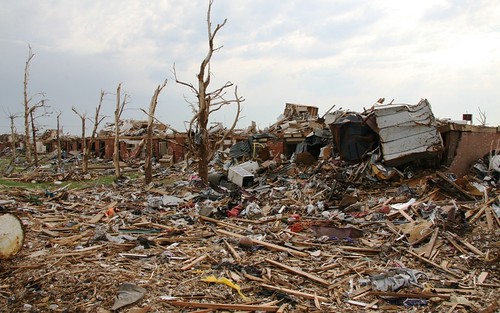 Photo from the US Army Corps of Engineers, Kansas City District
Photo from the US Army Corps of Engineers, Kansas City District
Joplin, Missouri resident Chris Patrick emailed yesterday to say he’d been thinking about my writing about bikes and the economy in light of his experiences in the wake of the tornado that destroyed a large part of his town this May.
He wrote: “Since about 15,000 vehicles were lost in the tornado and I am sure many didn’t have insurance, been seeing a lot more bikes around town. Lots of people are rebuilding their lives and, for some anyway, bikes are a part of that.”
He also included (with permission to share it) the story of bicycling to his parents’ house immediately after the tornado. I assume there was no phone service at that time, so the bike really was the fastest way to reach them:
Miraculously, my Giant mountain bike survived the EF5 tornado that came through here on May 22. There was destruction all around the house with car windows blown out, power lines down, and debris everywhere. But, my bike remained leaned up against the house under the open carport with no damage. It hadn’t moved! As someone who uses my bike for my primary transportation, it was incredible.
In the immediate aftermath of the storm, I was able to use my bike to cross town to my parents’ home, which had been destroyed in the storm. Thank goodness, they survived in their basement along with two young neighborhood families who just made it there before the storm hit. Their area was one of the worst hit and was featured on many national newscasts.
I carried my bike over downed lines and downed trees with debris everywhere but somehow was able to ride most of the way. Anyway, I have been on my bike through town almost everyday since the tornado.
As you allude to often in your writings, the perspective bicycling affords is certainly unique in comparison to the vast majority of folks in cars and trucks. Over 1,000,000 tons of debris has been picked up so far. Biking through this monumental effort (I live in the destruction area but the house is still standing somehow) has been a challenge. Unbelievably, I have not punctured a tube.
Bikes are getting a lot of coverage recently for their usefulness in the immediate aftermath of a disaster — usually the actual news comes from overseas, though there’s been increasing buzz in the U.S. about including bikes in emergency evacuation plans, particularly in the wake of the 2005 hurricane season when in at least one case — Hurricane Rita — the evacuation was the disaster, rather than the weather event itself.
Disasters that make the news and transform communities are usually visible, dramatic events that affect a lot of people at once. Advocates are always trying to point out that the accrual of everyday or individual trouble is as bad or worse — the toll of poverty, debt, disease, car crashes. These things may never be as compelling, but the more of us figure out that bicycling is a way out of these personal disasters, the better prepared we’ll be when our own tornado strikes.